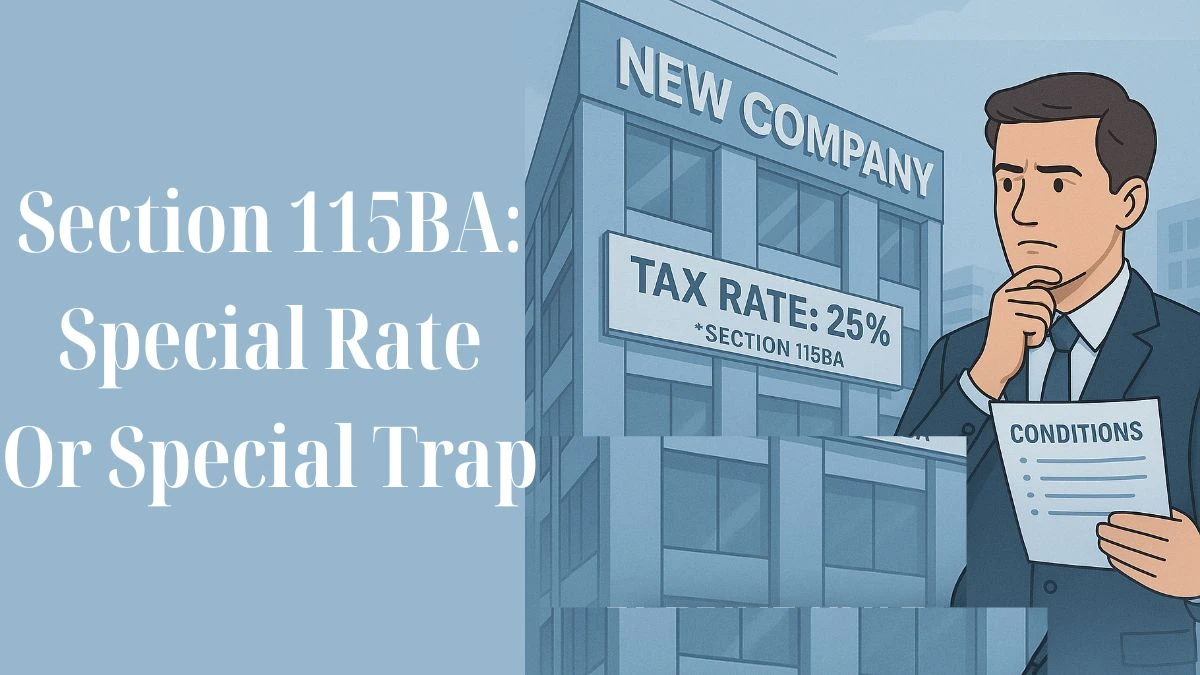
The Indian tax system has a lot to offer if you know where to look. One such opportunity lies in Section 115BA of the Income Tax Act, a section specifically introduced to provide concessional tax rates for certain domestic companies. If you’re in the manufacturing sector or planning to set up a new company, understanding this provision could help you optimise your tax burden significantly.
Let’s break it down in a simple, human-friendly way—just how you'd want your CA to explain it over a cup of coffee.
What Is Section 115BA?
The government introduced section 115BA to boost domestic manufacturing and attract investments. It gives newly set-up domestic manufacturing companies an option to pay tax at a concessional rate, provided they meet certain conditions.
Under this section:
- The base tax rate is 25% (excluding surcharge and cess).
- The concessional rate applies only if the company does not claim certain exemptions or incentives under other sections.
This means the company chooses to forego some deductions, but in return gets a lower and more predictable tax rate. It’s like choosing a plain pizza at a discount instead of a loaded one at full price—depends on your appetite (or business plan).
Who Can Opt for Section 115BA?
Here’s who qualifies:
- The company must be domestic.
- It must be engaged in the manufacturing or production of articles or things.
- It should not claim benefits under certain sections like 10AA, 32(1)(iia), 35, 35AD, etc.
- The option should be exercised on or before the due date of filing the first return.
So, if you’re setting up a company that manufactures electric components, for instance, and you’re not planning to claim accelerated depreciation or deductions for R&D expenses, you might consider opting for this section.
What Makes Section 115BA Attractive?
- Predictability: No complex exemptions or deductions to track.
- Lower Tax Rate: Compared to the regular rate of ~30%, a flat 25% sounds like a fair deal.
- Boost for Manufacturing: Encourages new industries, especially "Make in India" initiatives.
- Simple Compliance: Fewer claims mean less paperwork, fewer disputes.
It especially benefits startups or MSMEs that don’t have massive initial deductions and want to lock in a lower rate from the get-go.
How Does It Differ from Section 115BAA and 115BAB?
Good question.
- Section 115BAA offers a 22% rate to all domestic companies (existing or new), without claiming deductions.
- Section 115BAB offers a 15% rate, but only for new manufacturing companies set up after October 1, 2019, and starting production before March 31, 2024."
So, Section 115BA is the earliest version of the concessional tax route for domestic companies. It’s still valid and can be opted for under specific situations. But now, many taxpayers evaluate all three options before choosing the best fit.
A Quick Side Note on Compliance
If your company avails Section 115BA, it must:
- Maintain proper books of accounts.
- Files return within due dates.
- Refrain from claiming any disallowed exemptions.
Also, if you are a charitable trust that has transactions with a company opting for 115BA, and the company happens to be run by specified persons under Section 13(3), you need to ensure compliance at both ends. Because transactions by charitable trusts with specified persons can affect their tax-exempt status.
And yes, Section 13(3) defines specified persons to avoid misuse of funds and ensure fair dealings. So if you're running a company AND a trust, tread carefully. The department cross-verifies everything these days."
Final Thoughts
In a world of complicated tax laws, Section 115BA feels like a shortcut on a long, winding road. It may not be the most popular route today, thanks to newer sections like 115BAA and 115BAB, but it still holds value for the right business model.
Whether you're setting up a manufacturing unit or planning a tax-efficient structure for your new venture, a little strategic planning can go a long way in saving tax, legally and smartly.
💡 Still confused whether Section 115BA fits your business? Let our tax experts help you decide the best tax route. Visit Callmyca.com and schedule a quick advisory before you lock in your filing strategy. Your company deserves the best start, tax-wise too!











